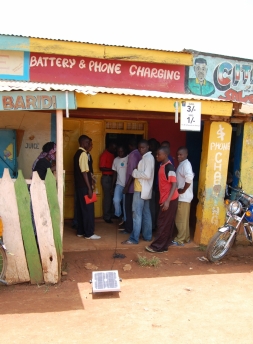Students win £10,000 for plan to create solar mobile phone charging business

MBA students win the Innovation, Entrepreneurship and Design business plan competition
By Tanya Gubbay
Friday 19 August 2011
A team of MBA students from Imperial College Business School has won £10,000 for a business plan that could enable retailers in the developing world to generate income by offering a solar mobile phone charging service to local people in remote areas.
The students, who developed the plan as part of their Innovation, Entrepreneurship and Design (IE&D) course, are now planning to put most of their prize money towards further developing the phone charger prototype, which is known as Solaris, and moving it towards manufacture.
See also:
The Solaris business plan was one of nine finalists selected for this year’s Business Plan competition. In this annual event, eligible teams selected from the IE&D course present entrepreneurial business cases based on ideas from external partners, Imperial staff or students, to a panel of experienced angel and venture capital investors. The competition is organised and supported by the Entrepreneurship Hub and Entrepreneurs Interactive at the Business School and provides competitors with feedback on their ideas and useful contacts, as well as the opportunity to win the cash prize.
The winning team, comprising of Siten Mandalia, Krzysztof Zylak, Tao Zhang, Michael Oshosanwo, Antonio Carvalho- Fernandes, Anirudhya Bardhan and Abdul Al-Ahdal, received their prize at a ceremony at the Business School on 19 July 2011.
Each plan was judged on three criteria: whether the plan identified a market opportunity that could realistically be met, whether the team offered a competitive advantage and whether the judges thought the team could execute the plan.

The first Solaris prototype being used in western Kenya
The winning team had been working on their business plan with the creator of the Solaris phone charger and Imperial alumnus, Siten Mandalia, since January 2011. His prototype device can charge several mobile phones at the same time and can function continuously on a typical sunny day. Having travelled through South Asia, East and Central Africa, Siten wondered if his device could open up opportunities for local businesses in these regions.
In order to formulate a solid business case, the students took this concept through a rigorous process of further investigation and evaluation. This included expanding the distribution and sales model, exploring how the business might develop and providing financial forecasting on profit margins and running costs. The team also created further designs for the product.
"As the business relies on a market in the developing world, where cultural differences can be very significant, it proved vital that the team thoroughly researched how the concept would fit into this arena and remained sensitive to these issues when putting together the final proposal," explained Mr Mandalia, who is the Director of Eternum Energy.
"Ideas for the business plan were thrashed out in intense brainstorming sessions which brought together individual research efforts, market knowledge, diverse skill sets and career backgrounds. The team were able to take my initial business idea to the next level – their insightful academic approach in addition to their experience of dealing with open-ended business problems, means that we now have a winning business plan that professional investors see real value in."
MBA student Krzysztof Zylak, who led the team in the competition, added: "The prototype went through many changes and was tested rigorously at every stage. As a result, we now have a highly efficient and robust device. The final design is now being prepared and we are working towards manufacture with our partners in China.
"Success in the competition would not have been possible without the team. Everybody brought something different to the table, making this a very unique experience. In any new business there are always teething problems to overcome, but I think Solaris has a very bright future."
-ends-
Applications for submitting a project into next year’s IE&D Projects programme open in September 2011. Further information is available at: www.imperial.ac.uk/entrepreneurship
Article text (excluding photos or graphics) © Imperial College London.
Photos and graphics subject to third party copyright used with permission or © Imperial College London.
Reporter
Press Office
Communications and Public Affairs
- Email: press.office@imperial.ac.uk
